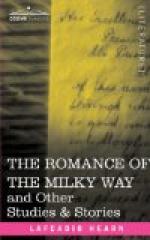“My children, it is time to separate! By daylight you must not be together, even for an instant: that were fatal! You must bid each other good-by.”
Without a word, It[=o] made ready to depart. He vaguely understood the warning uttered, and resigned himself wholly to destiny. His will belonged to him no more; he desired only to please his shadowy bride.
She placed in his hands a little suzuri, or ink-stone, curiously carved, and said:—
“My young lord and husband is a scholar; therefore this small gift will probably not be despised by him. It is of strange fashion because it is old, having been augustly bestowed upon my father by the favor of the Emperor Takakura. For that reason only, I thought it to be a precious thing.”
It[=o], in return, besought her to accept for a remembrance the k[=o]gai[75] of his sword, which were decorated with inlaid work of silver and gold, representing plum-flowers and nightingales.
[Footnote 75: This was the name given to a pair of metal rods attached to a sword-sheath, and used like chop-sticks. They were sometimes exquisitely ornamented.]
Then the little miya-dzukai came to guide him through the garden, and his bride with her foster-mother accompanied him to the threshold.
As he turned at the foot of the steps to make his parting salute, the old woman said:—
“We shall meet again the next Year of the Boar, at the same hour of the same day of the same month that you came here. This being the Year of the Tiger, you will have to wait ten years. But, for reasons which I must not say, we shall not be able to meet again in this place; we are going to the neighborhood of Ky[=o]to, where the good Emperor Takakura and our fathers and many of our people are dwelling. All the H[’e][:i]k[’e] will be rejoiced by your coming. We shall send a kago[76] for you on the appointed day.”
[Footnote 76: A kind of palanquin.]
* * * * *
Above the village the stars were burning as It[=o] passed the gate; but on reaching the open road he saw the dawn brightening beyond leagues of silent fields. In his bosom he carried the gift of his bride. The charm of her voice lingered in his ears,—and nevertheless, had it not been for the memento which he touched with questioning fingers, he could have persuaded himself that the memories of the night were memories of sleep, and that his life still belonged to him.
But the certainty that he had doomed himself evoked no least regret: he was troubled only by the pain of separation, and the thought of the seasons that would have to pass before the illusion could be renewed for him. Ten years!—and every day of those years would seem how long! The mystery of the delay he could not hope to solve; the secret ways of the dead are known to the gods alone.
* * * * *




